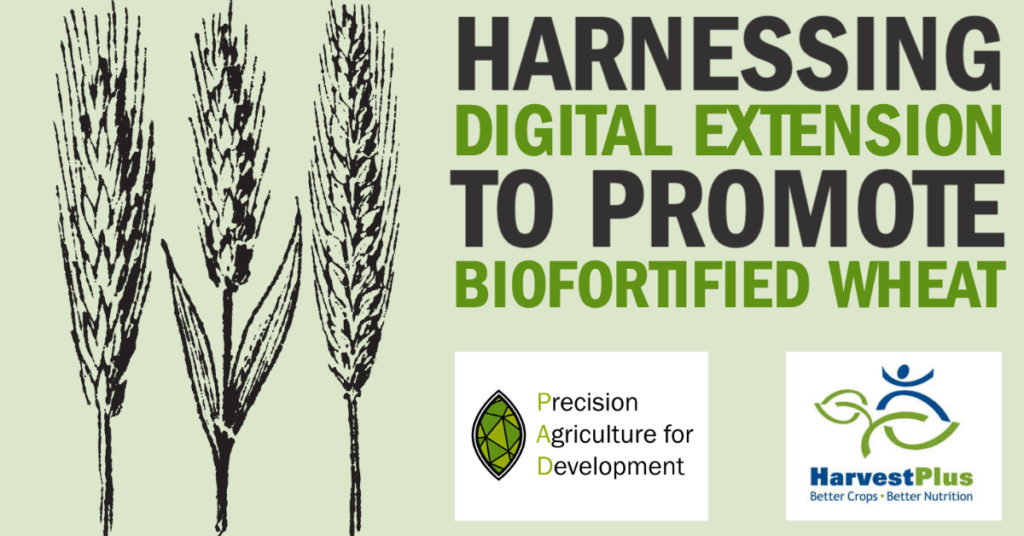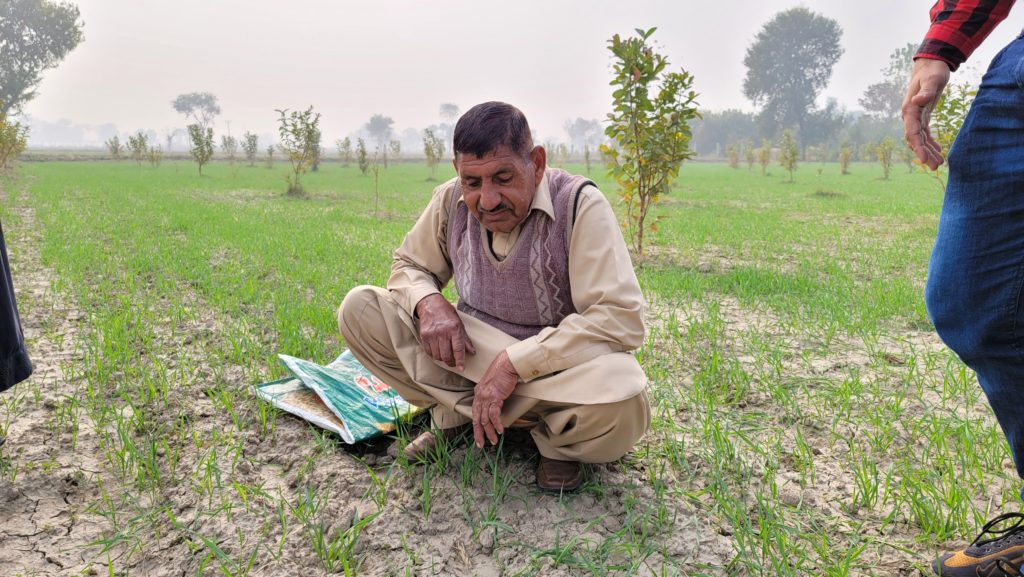Harnessing Digital Extension to Promote Zinc Biofortified Wheat and Improved Nutrition
- January 28, 2021
- 5 minutes read
Hassan Ammar, PAD Project Manager, reports on the implementation of an exciting new pilot in Pakistan.

Over the course of the past four months, our team in Pakistan has commenced implementation of a groundbreaking new pilot to promote the adoption of two zinc biofortified wheat varieties to smallholder and progressive farmers in Punjab Province.1 The project is being implemented in partnership with HarvestPlus, a program of CGIAR, whose mission is to “build sustainable food systems and bridge the gap between agriculture and nutrition… by breeding vitamins and minerals into everyday food crops”.
Zinc deficiencies are particularly prevalent in low- and middle-income countries, who bear a disproportionate burden of micronutrient deficiencies more generally. Adequate zinc micronutrient consumption is critical for gene expression, cell division, the development of immunity, and reproduction. A zinc deficient diet can weaken and undermine the development of immune systems, trigger stunting and inhibit cognitive functioning in children, and contribute to pregnancy complications. Among young children, a zinc deficiency significantly increases the risk of severe outcomes associated with diarrhea, pneumonia and malaria, including death.
Rigorous prevalence studies are limited, however available information suggests widespread zinc deficiency among children in Pakistan: More than one third of preschool-aged children and more than half of primary school children were assessed to be zinc deficient. While data is lacking, studies also suggest an alarming rate of zinc deficiency among pregnant women, which may contribute to Pakistan’s poor infant and maternal mortality rates.

Sixty percent of the average Pakistani citizen’s daily diet consists of wheat products. For poor, rural and wheat farming populations, this is likely to be higher. Encouraging the adoption of zinc biofortified wheat may significantly boost zinc consumption within smallholder households, with positive implications for the health of smallholder families. HarvestPlus estimated that regular consumption of zinc biofortified wheat can provide up to 60 percent of daily zinc needs for women and children, which is 30 percent more than commonly grown varieties. Additionally, zinc biofortified varieties offer additional advantages to farmers – they have been developed to be more disease resistant, and are associated with higher yields than traditional varieties.
The pilot, which commenced in October, is focused on raising awareness about the nutritional and agronomic benefits of zinc biofortified wheat. Launched during the 2020 Rabi wheat season (the second sowing season which runs from October through December, and which is harvested in April through May), the pilot will continue until March 2021.
PAD has partnered with HarvestPlus to send customized SMS and Push Calls to 100,000 farmers in five districts of Punjab in Pakistan. Advisory content provides information in local languages (Urdu and Saraiki) to farmers. In addition to pushing advisory information to farmers, the pilot includes a helpline, backed by a call center, which farmers can call with questions, and which is used to obtain farmer feedback about adoption of biofortified crops and to conduct farmer profiling via surveys and focus groups.
To date, approximately 1million SMS and 967,668 robocalls have been placed to farmers. Push call content has focussed on the benefits of zinc for nourishment, immunity against diseases, and the relative resistance of Akbar19 and Zincol16 wheat varieties to rust and other wheat pests and diseases relative to wheat varieties more commonly planted in Punjab.
A total of 1,325,464 SMS have been sent to farmers in a series of 17 campaigns. Messages provide information on the signs of and risks posed by zinc deficiency, the agronomic and nutritional benefits of zinc wheat, and the commercial benefits of zinc wheat to farmers.
This project and the messages to be sent to farmers are approved by the Government of Punjab, Department of Agriculture Southern Punjab, which plays a critical role in ensuring the smooth functioning of the agricultural system in Pakistan. Working hand in hand with government officials, PAD and HarvestPlus will bridge the gap between the public and private sector by linking farmers to seed providers.
This project will also facilitate the use of seed diffusion where farmers pass on seeds to their friends and family but also private sector seed sales when farmers and larger growers are looking for the latest and best varieties.
By working with the relevant Departments of Agriculture and conducting surveys, PAD will be able to ascertain how successful HarvestPlus and PAD have been in their partnership to expand the reach of nutritious zinc-biofortified wheat in Pakistan by leveraging mobile communications to engage progressive and smallholder farmers.
In the Pakistan project, HarvestPlus and PAD aim to track the specific reach and delivery of the mobile messages against subsequent farmer-reported seed transactions to demonstrate the project’s impact and return on investment. We look forward to reporting our learning from this pilot in future blog posts.
1As determined in the most recent Agriculture Census, a farmer working 25 acres or more is designated as a “progressive farmer”. In 2010, farms with less than 5 acres of land constituted 64 per cent (5.35 million) of the total private farms but they operated only 19 per cent (10.18 million acres) of the total farm area. Whereas, the farms that were of 25 acres and above in size, comprised only 4 per cent (0.30 million) of the total farms but they commanded 35 per cent (18.12 million acres) of the total farm area. The average size of farm in the country was 6.4 acres whereas the cultivated area per farm was 5.2 acres.

Stay Updated with Our Newsletter

Make an Impact Today


